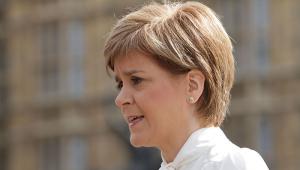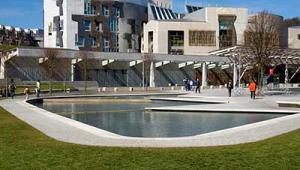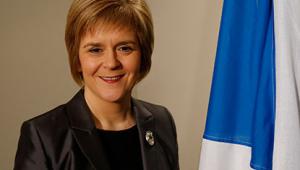Speaking as polls continued to predict an SNP landslide in Scotland and a near wipe-out for Labour – including the Eastwood seat of Scottish Labour leader Jim Murphy – Sturgeon directly addressed voters south of the border, declaring: ‘We will seek to make common cause and build alliances with others of like mind across the UK to deliver the progressive change that so many want to see.
‘A stronger voice for Scotland will mean new, better and more progressive politics at Westminster – for everyone.’
The manifesto calls for a 0.5% annual real-terms spending rise to invest an extra £140bn in public services to boost living standards and accelerate the recovery. It also pledges to restore the 50p income tax band for incomes above £150,000, to raise the national minimum wage to £8.70 an hour by 2020, and to build 100,000 affordable homes per year across the UK.
It promises to deliver an additional £24bn – some £9.5bn net of projected inflation – in health spending across the UK, including an extra £2bn for the NHS in Scotland, and says that its proposals can be achieved by slowing, but not reversing, deficit reduction.
‘The manifesto we publish today sets out our priorities for progressive change,’ Sturgeon said. ‘It is a manifesto, above all else, to end austerity. That will be our number one priority.’
To voters in Scotland, she said: ‘The pledge I make to the Scottish people is this. If you vote SNP on 7 May, we will make your voice heard more loudly and clearly than it has ever been heard before at Westminster.’
It is an agenda widely seen as preparing the way for a potential post-election pact with Labour, the SNP having explicitly ruled out sustaining the Conservatives in office. Several of the proposals, notably on income tax and the minimum wage, sit well with Labour’s own plans.
But the SNP is also committed to saving £3bn-4bn a year by cancelling the Trident replacement programme. Labour plans to go ahead with Trident, and could count on Tory votes in the Commons to push the decision through, raising questions about how realistically the SNP could make support for a minority Labour government conditional on Trident’s cancellation or removal from Scotland.
Labour’s Ed Miliband, meanwhile, has ruled out a full coalition with the SNP – which the SNP anyway claims not to want – but has appeared to leave the door open to some less formal deal.
Shadow Chancellor Ed Balls, however, said in a weekend TV interview: ‘We're not going to start getting involved in coalitions or deals with a political party that wants to break up the United Kingdom.’
The Conservatives have seized on Sturgeon’s offer of a ‘progressive’ alliance to argue that a Labour-led government would have to dance to the SNP’s tune.
Prime Minister David Cameron is today offering what he calls the ‘Carlisle Principle’ in the form of an annual review to ensure voters south of the border are not disadvantaged by enhanced devolved powers in Holyrood.
Labour, in turn, claims that the SNP would prefer to see the Tories win at Westminster, since that could increase demand in Scotland for independence.
SNP leaders, by contrast, contend that Sturgeon’s pledge in the TV leaders’ debates to hold Labour to a more radical agenda has aroused widespread interest from disenchanted Labour voters outside Scotland.




















